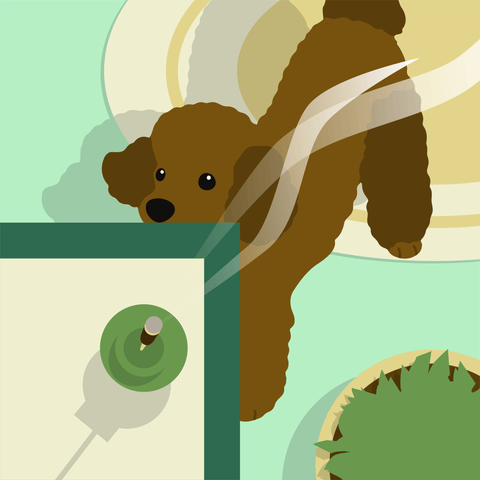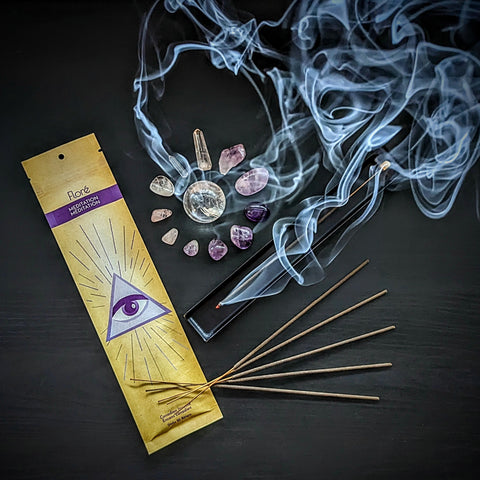Is it safe to burn incense around pets?
When burning incense, it is incredibly important to consider the health and safety of those who are not actively involved in choosing to burn incense. This can apply to students in a yoga class who may not enjoy or be allergic to ingredients in incense, to our children, and of course, to our pets.
Our furry and feathered companions are part of the family, and we would never want to put them in harm’s way. Collectively, the owners of Floré have owned dogs, cats, guinea pigs, rabbits, hamsters and rats, so believe us when we say this is an important consideration for us too.
To start, we need to acknowledge the fact that burning ANYTHING releases particulates into the air. Whether it is incense, candles, or wood burning in a fireplace, there are tiny particles released into the air that you breathe, and therefore the air that your pet is breathing.
As we release this blog, large areas in North America are experiencing the intense impact of the Manitoba wildfires, which is having a significant impact on air quality overall. This is a real concern and you can choose to stop burning anything in your home in order to decrease you and your pet’s exposure to air particulate.
Unfortunately, the air outside of your home is beyond your control. What you can do to help is make a donation to the Canadian Wildfire Fund through the Canadian Red Cross if you are able to do so.
Burn Smart: Our top 4 tips for safely burning incense around pets:
- PROPER VENTILATION IS CRITICAL: Always burn incense in a well-ventilated space to keep the air moving and prevent buildup of smoke
- KEEP IT OUT OF REACH: Even when it’s not burning—yes, we’re looking at you, dogs—incense sticks and ash can be tempting chew toys
- WATCH FOR REACTIONS: Pets can have sensitivities just like humans. If your dog leaves the room or your rabbit hides in their hutch, take the hint
- WHEN IN DOUBT, SNUFF IT OUT: Always better to err on the side of caution. Your incense can wait; your pet’s comfort comes first
Every Pet is Unique
A cat has absolute emotional honesty: human beings, for one reason or another, may hide their feelings, but a cat does not.
No two animals react the same way. Your chill golden retriever might not even flinch, while your aloof tabby could be halfway under the couch after one whiff of patchouli. (Ask Kayte’s cat, Quark.)
Look for subtle cues: raised ears, twitchy noses, or a strategic retreat. These behaviours can signal curiosity—or discomfort. Trust their instincts and adjust accordingly.
Quark's Quirks
Quark is one of the cats in the Floré family. Despite being a faucet-sitting, bath-loving anomaly of a cat, patchouli is his no-go scent for Quark. Quark is a quirky little dude but he is incredibly easy going and chill. He will sit under a faucet of running water like it’s nothing. He loves to be picked up and is insanely curious, but if you start burning something with patchouli in it, he is nowhere to be found.
For this reason, Quark’s owner does not burn anything that contains patchouli in her home. The Protection incense blend (a personal favorite) is no longer an option, but other fragrances without patchouli do not seem to bother Quark at all.
Small pets, big considerations
If you own smaller caged animals—hamsters, guinea pigs, rabbits, or birds—take extra care. Pay close attention to your caged pet when burning anything, they cannot escape to another room.
- Monitor your pet’s reactions closely: Birds, in particular, are highly sensitive to airborne particles. When in doubt? Skip the burn.
- Keep their cages far from smoke sources: Ventilation matters even more in confined spaces, keep a window open and do not put the incense right next to the cage.
- Their respiratory systems are delicate: You may want to avoid burning incense in the same room if it is a small space, or lacks ventilation or a window that can be opened.
We would be remiss to not discuss what can impact the respiratory health of your small pet the most: their bedding materials. Cedar or pine chips are commonly used for small caged pets, but their aromatic oils can be harmful to their respiratory health over time.
A caged pet with cedar or pine chip bedding is directly exposed to the oils everyday, right under their noses, a far more significant exposure than incense smoke in a well ventilated room.
You can choose to use aspen chips, shredded paper, or washable fleece for your caged pets bedding instead.
With free range house bunnies, you may choose to use cedar or pine chips in their litter box, as they are not being continuously exposed to the volatile compounds in the natural oils. Just make sure that if you have a free range bunny, you have chew-proofed your home - no electrical cords or toxic materials at their level.
Also, expect wooden furniture will be gnawed on, as rabbits chew on things like wood to grind down their teeth, which are constantly growing. Same with guinea pigs and hamsters, their teeth constantly grow, but as free range pets, they will poop and pee wherever they want.
Frequently asked questions about burning incense around pets:
Is incense bad for cats?
Not inherently, but cats can be sensitive to certain scents. Always burn incense in a well-ventilated space and watch for signs of discomfort. Many cats dislike citrus-based scents like Lemongrass. If you find that neighbourhood cats are coming into your yard and you wish to repel them, try burning a stick of citrusy incense outside.
If you own a cat, please do not let it outside. Many municipalities have bylaws against letting your cat outside for a very good reason: Cats kill over 100 million song birds in Canada per year. Outdoor cats also lead shorter, more dangerous lives.
Can I burn incense around dogs?
Yes, as long as it’s done safely. Make sure the area is ventilated, keep incense out of reach, and pay attention to how your dog reacts. If they leave the room or seem agitated, it's best to extinguish the incense.
What types of pets are most sensitive to incense?
Birds, hamsters, rabbits, and guinea pigs have very delicate respiratory systems, and if they are caged, they cannot get away from scents they do not enjoy.
You know your pet better than anyone else. Make sure you pay attention whenever you burn incense or any other combustible material. Always ensure good ventilation and when in doubt, snuff it out.
Written by Flo Ray





